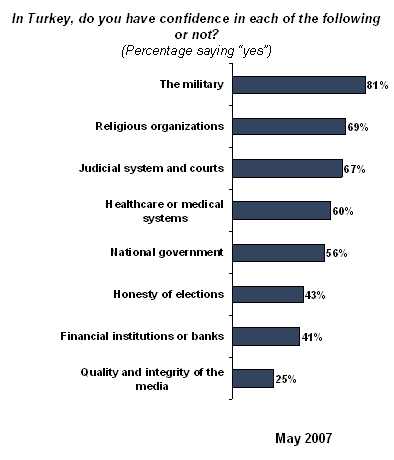GALLUP NEWS SERVICE
PRINCETON, NJ -- So far this year, Turkey's political landscape has been anything but dull. Just a few months before the latest Gallup World Poll was conducted there, the ruling Justice and Development Party (AKP), whose roots stem from political Islam, selected Foreign Minister Abdullah Gul to become the country's next president. The announcement prompted a swift reaction from Ankara's top military brass. Within two days of Gul's selection, the Turkish Armed Forces asserted their position as the defenders of secular values in a memorandum posted on their Web site.
The political crisis that ensued prompted the parliament to call for early general elections. And on July 22, the AKP won 47% of the popular votes, 12 percentage points more than in the 2002 elections. It was the first time since 1954 that a ruling party in Turkey won more votes in its second term than in its first.
Gallup data collected in May 2007 show that Turks are more likely to express confidence in their country's military than in any other national institution. Eighty-one percent of respondents said they have confidence in the military. Although several other Turkish institutions also fare well, they don't enjoy a level of trust this high. For example, majorities of Turks say they have confidence in country's religious organizations (69%), judicial system (67%), healthcare system (60%), and national government (56%). Turkey's financial system, electoral system, and media are all perceived as trustworthy by less than a majority of residents.

Turks' confidence in the military may stem in part from the central role the institution played in the founding of the country after World War I. Periodically over the past 40 years, the armed forces have intervened during times of unrest. As a result, many Turks perceive the military as a stable institution that can protect them from any potential threat. However, political observers say that although Turks respect the military, they don't want it to run the country's affairs. Furthermore, their vote of confidence in the pro-secular military does not imply a lack of trust among Turks in religious institutions. Indeed, as the graph indicates, about 7 in 10 Turks (69%) say they have confidence in the country's religious organizations, the second-highest percentage after confidence in the military.
Finally, in order to prepare for potential EU membership, Turkey has engaged in several judicial-system reforms, which may help explain why Turks are currently more likely to say they have confidence in the country's judiciary (67%) than in its national government (56%) or electoral system (43%).
Survey Methods
Results are based on face-to-face interviews with 1,001 adults in Turkey in May 2007, aged 15 and older. For results based on the total sample of national adults, one can say with 95% confidence that the maximum margin of sampling error is ±3 percentage points. In addition to sampling error, question wording and practical difficulties in conducting surveys can introduce error or bias into the findings of public opinion polls.
